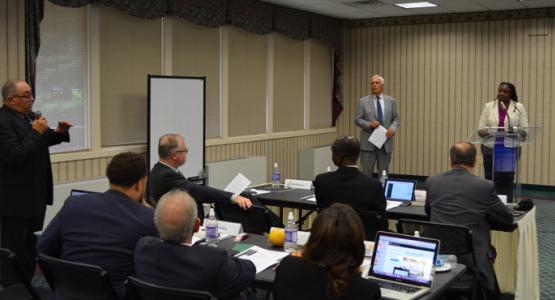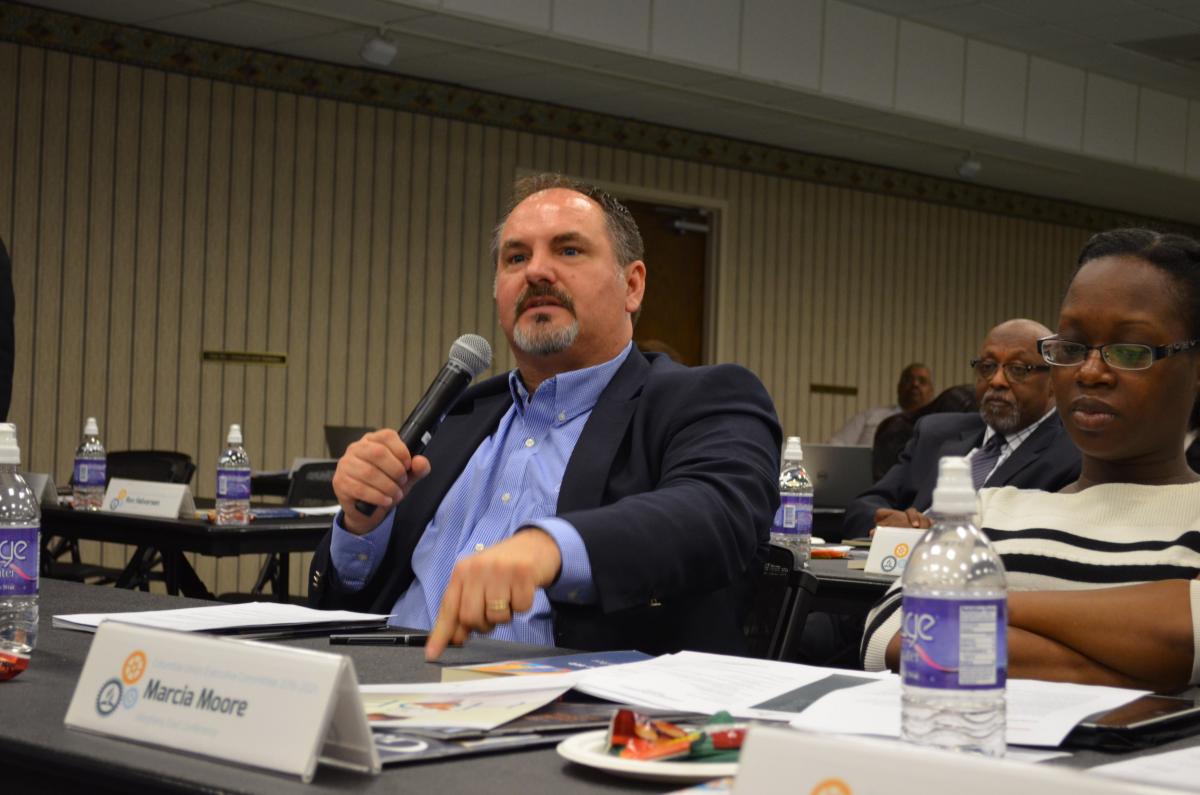
Columbia Union Conference Issues Call to Compassion
Story by V. Michelle Bernard
Rubén Ramos, the Columbia Union Conference’s vice president for Multilingual Ministries, regularly hears stories of immigrant members afraid of deportation. One local church leader from Alexandria, Va., recently approached him, asking for prayer after her husband, a legal resident of the United States, was arrested and threatened with deportation. Ramos says she was also worried about her status, but said, “If they deport me. I’ll go to El Salvador and plant another church.”
Henry J. Fordham (pictured speaking above), president of the Allegheny East Conference, shared a story of two members from an Indonesian congregation who were recently arrested after submitting immigration applications. “People are living in fear,” he said. “Our members need to know that we care.”
Church leaders throughout the union’s territory say they are regularly hearing similar stories. An estimated 40,000 of the union’s constituency are immigrants, and there are 283 immigrant churches in the union’s eight-state territory.
During the Columbia Union Executive Committee meeting today, members voted to issue a statement titled “Immigration: A Call to Compassion.”
Immigration: A Call to Compassion
While the immigration process has been an ongoing struggle for many communities, recent discussions have increased worry and uncertainty among some of our membership and resulted in challenges to the fulfillment of our Christian mission.
How should we relate to this?
The Bible teaches that God made all humankind of one blood (Acts 17:26), and we are all sons and daughters of God through faith in Christ Jesus, neither male nor female, Jew nor Greek (Gal. 3:26, 28); that we are instructed to treat the foreigner as the native-born (Lev. 19:33-34); and that we are called to unity and love toward one another (John 17:21-23; John 13:34).
As members of the community, we must respect the law. As members of the church, we have the moral responsibility to care for the disadvantaged (Leviticus 23:22) and denounce oppression, abuse and mistreatment in any form (Ps. 82:3, 4; Isa. 1:17).
To those who are experiencing uncertainty and fear, be assured that we care, you are in our prayers and we are responding to your needs.
In addition, we call on members, churches, conferences and other entities to seek opportunities to minister to those who are impacted, providing help and access to resources and information.
As we respond to these and other needs with compassion in Jesus’ name, may our churches become known far and wide as centers of hope and healing.
#####
Ramos and Celeste Ryan Blyden, the union’s vice president for strategic communication and public relations, working with the union leadership team and the conference presidents, drafted the statement with the goal of raising awareness, and also to encourage members to be proactive in showing compassion and providing help.
“I think the statement strikes a really nice balance by avoiding the political side of the issue,” says David Dildy (pictured right), a committee member representing the Potomac Conference.
 Tim Madding (pictured left), a committee member and lead pastor of the Potomac Conference’s Beltsville (Md.) church, said he saw the statement as a “call to minister. I see this as telling the members of the church to not be silent, to stand up with hearts of compassion and do something about it.”
Tim Madding (pictured left), a committee member and lead pastor of the Potomac Conference’s Beltsville (Md.) church, said he saw the statement as a “call to minister. I see this as telling the members of the church to not be silent, to stand up with hearts of compassion and do something about it.”
Ramos also reported that churches in the Chesapeake and Potomac conferences are already working to provide resources and information to members through workshops.
Committee members also asked union leaders to identify other ways in which the Seventh-day Adventist Church in this region can actively help.
Lori Farr, a pastor and committee member from the Ohio Conference, encouraged the leaders to team up with local organizations already working in immigration matters. “We don’t have to start from scratch, but we can partner and help,” she said. “Go out there and find those ministries. Then ask them, ‘How can we help?’”
Read the statement in Spanish.

Add new comment